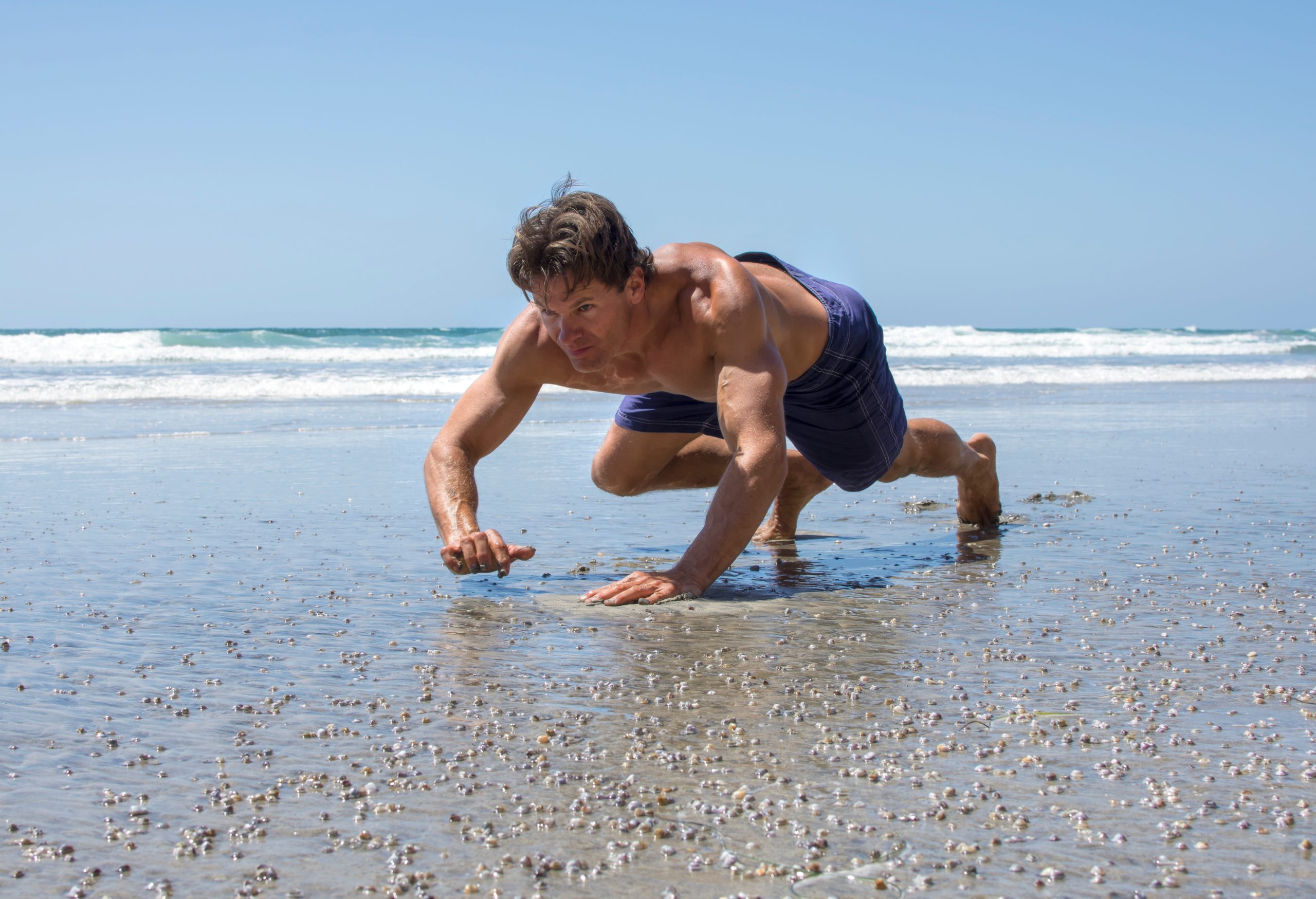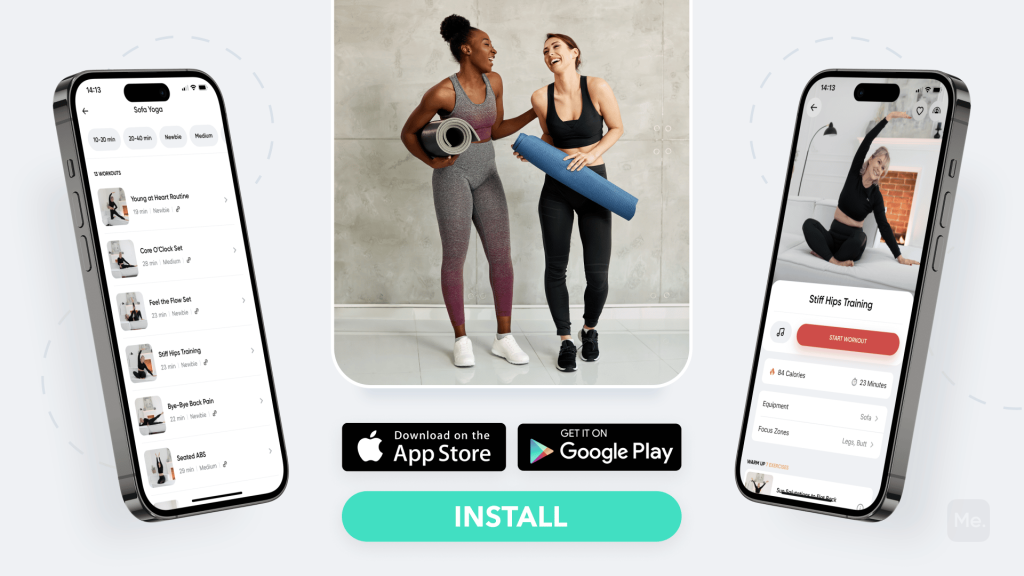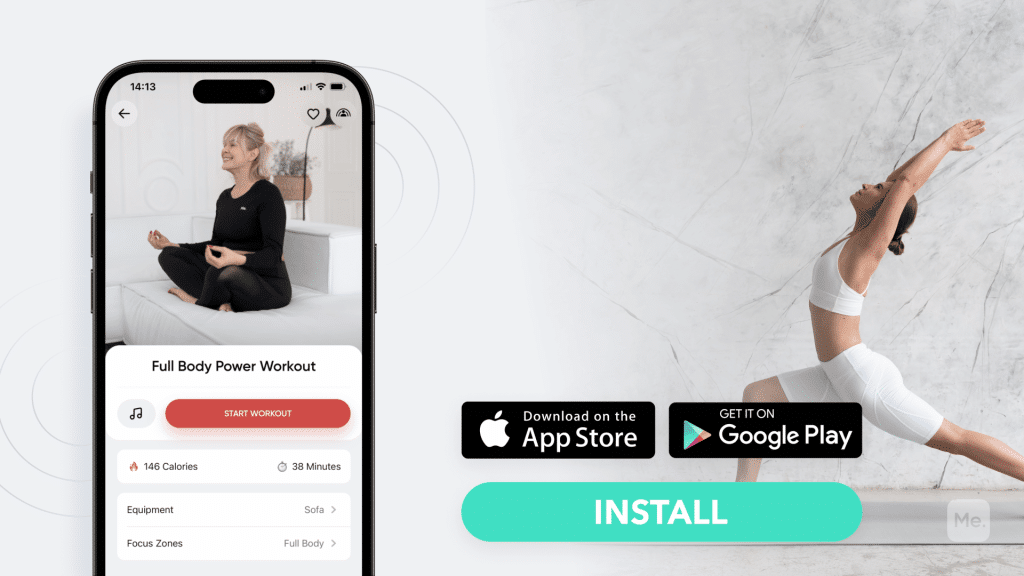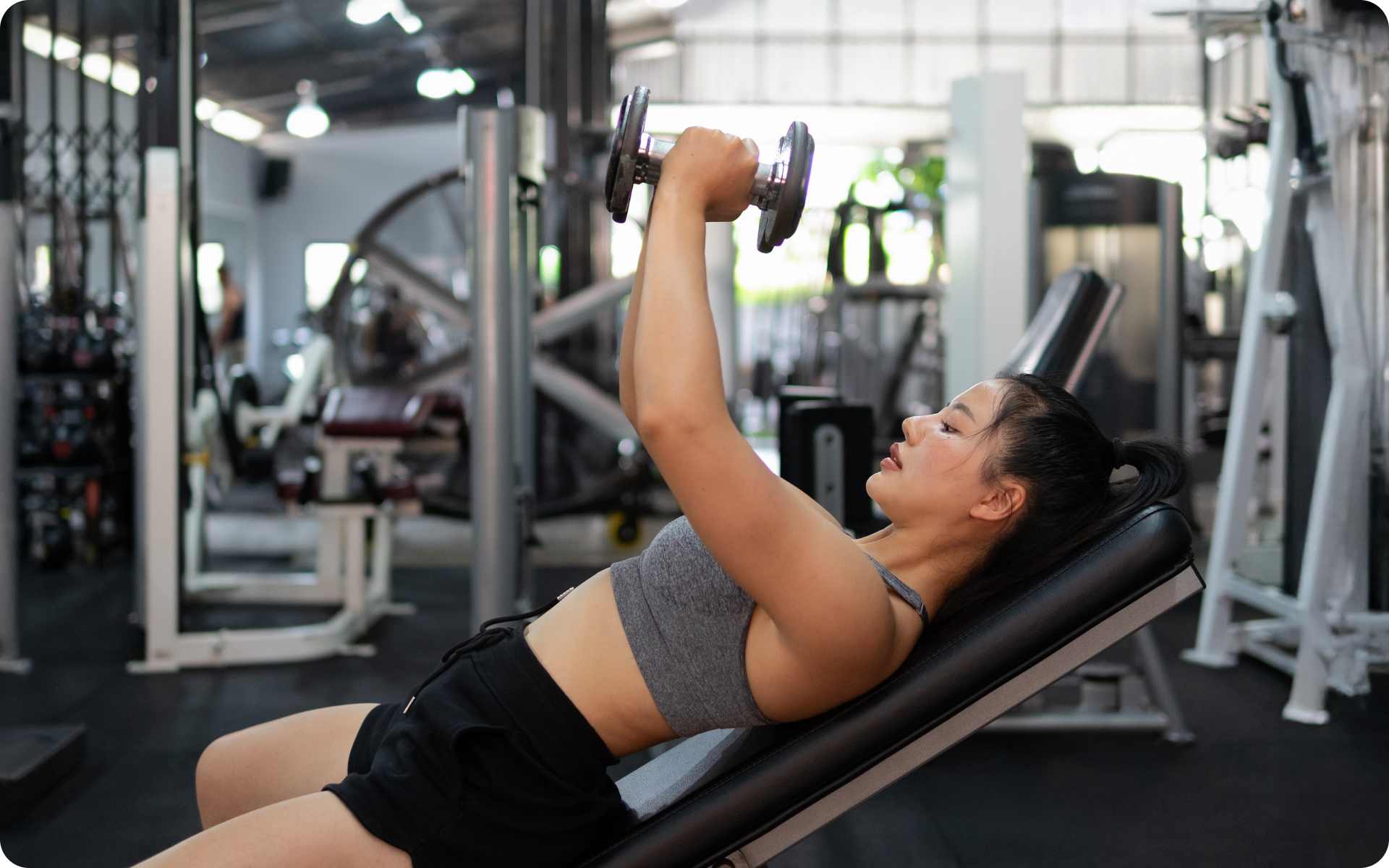The bear crawl exercise is one of those workouts that if you are unfamiliar with it and then randomly see it being done, will probably have you thinking that you took a wrong turn somewhere and ended up in a random place that only looks like your gym. Those who are familiar with it would likely gladly inform you that despite how odd it might look, this exercise is often included in intermediate and advanced crossfit and other high intensity workout programs because of its numerous benefits. If you are curious about how crawling – an activity often left to babies – could possibly improve your fitness and strength, then you are in the right place. In today’s article, we shall be taking you through how to do this workout, outline some bear crawl benefits, tell you which muscles benefit the most from bear crawls, and much more.
Get your personalized
meal plan!
What Is The Bear Crawl Exercise?
Before getting into the bear crawl exercise benefits, what is this exercise and how do you do it?
At a quick glance, the bear crawl looks quite similar to the baby crawl, however, the two are not the same. With the baby crawl, your bodyweight is supported with the hands (palms) and the knees with the toes doing little to no work. On the other hand, with the bear crawl, you support your weight on your hands and toes rather than your knees.
But what is this workout exactly? It is a bodyweight mobility, strength, and cardio exercise that will have you sweating, out of breath and burning loads of calories in no time.
What Are Bear Crawls Good For?
When it comes to bear crawl muscles worked, this workout, like pushups and mountain climbers, uses almost all the muscles in your body, and thus is considered a full body workout. However, the muscles mostly used include those in your shoulders, core, glutes, chest and back, quads, calves, as well as the hamstrings.
How To Do The Bear Crawl Workout
Equipment – Luckily this exercise doesn’t need any special equipment. It can be done both indoors and outside. As long as you have enough open space (you can walk about 10 paces across), you are good to go. PS, make sure the surface isn’t too rough so as not to hurt your palms.
Here’s how to do it:
- Start by getting on the ground on all fours. Your palms should be on the floor with the wrists right under the shoulders.
- Once your wrists are in the right position, turn your attention to your knees, core, back and feet.
- Your knees should be right under your hips.
- Core should be tight – Think about pulling your belly button toward the spine.
- Your back should be flat – Do not drop your belly or curve the spine upwards.
- Your feet should be hip-width apart with the toes tucked and touching the ground.
- On an inhale, lift your knees slightly off the ground by pressing your palms and feet/toes into the ground. The knees should hover one or two inches off the ground.
- Keeping your back straight and your core tight, crawl forward by simultaneously moving the right hand and the left leg forward. Remember that your knees shouldn’t touch the ground at any point during this movement.
- Switch sides immediately after placing weight on the right hand and left leg, moving the left hand and right leg forward.
- Keep crawling forward for your desired number of steps/distance.
Important points to remember:
- Make sure that your keep breathing throughout the exercise.
- Knees should remain 1 or 2 inches off the ground throughout – this is not a baby crawl.
- If you do not have enough space to keep crawling forward till exhaustion, just turn around and head back to the start position once you get to the wall.
- If you have a wrist or shoulder injury please avoid this workout till the pain faded or injury heals.
- Always warm up before any workout, include this one as it prevents any injury.
Read More: What Are The Thruster Muscles That Are Worked, And How Will This Exercise Benefit You?
The Benefits Of Bear Crawl Workout
Now that you know how to execute this workout, what benefits does the bear crawl exercise have on people?
Some of them include:
- No equipment needed – As seen above, the bear crawl exercise is pretty convenient to do as all you need is ample space and your body. You do not even need to be in an actual gym to get the workout in. Whether you are at home, in a park, or even at the beach, you can easily get on all fours and get a quick workout in.
- It’s a great core workout – Let’s be honest, many of us are bored of having to do the same old sit up and crunch workout variations in the name of core exercises. If you are looking for some variety in your core workout, the bear crawl is a great option to try out. In fact, in 2017, one study stated that animal flow movement exercises like this one had a greater effect on the core muscles than static exercises like the plank (2).
- It is a compound exercise – Compound workouts are exercises that work multiple muscle groups at the same time. As mentioned before, not only is this workout considered a full body workout, but it also targets your core, glutes, calves, shoulder, chest, quads, hamstrings, and back muscles at the same time.
Research has shown that compound exercises are better than isolation or single joint/muscle exercises because they help you burn more calories, boost faster muscle gains and strength, will elevate your heart rate faster, improve flexibility, and help maximize your oxygen consumption (4).
- It is a great functional workout – Crawling is a form of quadrupedal movement. For anyone unaware, quadrupedal movements are those that use all four limbs to either walk or run. These exercises incorporate animal poses, transitions, and crawling patterns to improve fitness. Such movements are often seen in unconventional activities or workouts such as climbing, free running, parkour, etc.
In a study published in the The Journal of Strength and Conditioning Research, earlier this year, researchers found that when compared to regular physical activity, those who add quadrupedal movement training on to regular workouts had better functional movement, flexibility, and stability (5).
- Works well as an alternative cardio workout – Don’t feel like running, walking, cycling, jumping rope, or swimming but you still want a challenging workout that will get your heart rate up and burn some calories? Try some bear crawls instead. Improved cardio fitness may not seem like an option for bear crawl workout benefits, but it is indeed possible.
As stated above, this workout will improve your maximum oxygen consumption just like other cardio exercises (4). That aside, a study published this year in the Frontiers in Sports and Active Living journal found that when compared to walking, quadrupedal movement training burned more calories and improved heart rate in the older adult subjects (1).
- It will help you move better – The bear crawl exercise is a mobility exercise that can help everyday movements become easier and smoother.
Mobility exercises are defined as exercises that will increase your range-of-motion and your stabilization, or control of the muscles that surround each joint. According to a very recent study, quadrupedal movement training will significantly increase your hip and shoulder mobility (5).
- Will improve hand-eye coordination and brain function – Like mobility, these are two bear crawl workout benefits that are essential for day-to-day activities. Because you are moving opposite sides of your body in coordination with each other (right hand, left leg and vice versa), this will help boost your hand-eye and overall coordination skills. In fact, in a study published back in 2013, researchers stated that the crawling stage in the life of infants is very important as it helps develop their memory, hand-eye coordination, and spatial cognition (6).
In terms of brain function, a study published in the Human Movement Science journal in 2016 stated that by doing 60-minute quadrupedal movement training for 4 weeks, study participants were reported to have significantly improved cognitive flexibility (3). Cognitive flexibility is important as it enables an individual to work efficiently to disengage from a previous task, reconfigure a new response set, and implement this new response set to the task at hand. In layman’s terms, your brain is able to adapt to new, changing, or unplanned events faster.
When it comes to weight loss, progress is made by inches, not miles, so it’s much harder to track and a lot easier to give up. BetterMe app is your personal trainer, nutritionist and support system all in one. Start using our app to stay on track and hold yourself accountable!
FAQs
How Can I Make The Bear Crawl Exercise More Challenging?
As an intermediate and advanced workout, this exercise is already quite challenging to many. However, if you’d like to test your strength and endurance, here are some things that you could do to make the workout even more challenging
- Wear wrist or ankle weights
- Increase the distance covered or number of sets
- Try racing with a friend – The challenge here is to beat your friend without rushing through the exercise. Remember that bear crawls are not about speed
- Wear a weighted vest
- Tie a rope around your waist and pull something heavy behind you
What Are Some Of The Reverse Bear Crawl Benefits?
The reverse bear crawl is just one of the many variations of this workout. In this, instead of moving forward with alternating hands and feet, you will instead crawl backward alternating their hands and feet. The benefits of this variation are the same as the standard bear crawl benefits. However, because you are moving backward and can’t really use your eyes to monitor where you are going, this adds a slight level of difficulty which can help work to improve your general coordination and spatial awareness.
Read More: Tone Your Arms Using Triceps Exercises With No Equipment Required
What Are Some Other Variations Of The Bear Crawl Exercise?
Some variations of this workout include:
- Weighted bear crawl – Ordinarily, this workout just uses your bodyweight but you can also use a weighted vest or heavy backpack to add some weight while doing the standard bear crawl. You could also use some dumbbells.
- Sideways bear crawl – Start in the same position as you would the standard forward crawl. Instead of moving forward, move sideways, either to your right or left. Make sure to move while alternating the hands and legs – left hand with right leg, right hand with left leg.
- Uneven bear crawl – This is your standard forward bear crawl only this time you do it on a slope or hill. The incline and uneven ground add quite the challenge to this workout.
The Bottom Line
Bear crawl benefits show that this unconventional compound workout should definitely not be overlooked. From improving cardiovascular health, burning calories, working multiple muscles at the same time, to improving coordination and much more, it is a fantastic workout to include in your routine.
As usual, if you have some injury of some sort, please wait for it to heal before engaging in any physical activity, and always watch your form to ensure that you do not injure yourself and that you are working the right muscles.
DISCLAIMER:
This article is intended for general informational purposes only and does not serve to address individual circumstances. It is not a substitute for professional advice or help and should not be relied on for making any kind of decision-making. Any action taken as a direct or indirect result of the information in this article is entirely at your own risk and is your sole responsibility.
BetterMe, its content staff, and its medical advisors accept no responsibility for inaccuracies, errors, misstatements, inconsistencies, or omissions and specifically disclaim any liability, loss or risk, personal, professional or otherwise, which may be incurred as a consequence, directly or indirectly, of the use and/or application of any content.
You should always seek the advice of your physician or other qualified health provider with any questions you may have regarding a medical condition or your specific situation. Never disregard professional medical advice or delay seeking it because of BetterMe content. If you suspect or think you may have a medical emergency, call your doctor.
SOURCES:
- A comparison of the energy demands of quadrupedal movement training to walking (2022, frontiersin.org)
- Effects of Static, Stationary, and Traveling Trunk Exercises on Muscle Activation (2017, researchgate.net)
- Quadrupedal movement training improves markers of cognition and joint repositioning (2016, pubmed.ncbi.nlm.nih.gov)
- Resistance Training with Single vs. Multi-joint Exercises at Equal Total Load Volume: Effects on Body Composition, Cardiorespiratory Fitness, and Muscle Strength (2017, ncbi.nlm.nih.gov)
- The Effects of a Novel Quadrupedal Movement Training Program on Functional Movement, Range of Motion, Muscular Strength, and Endurance (2022, pubmed.ncbi.nlm.nih.gov)
- The role of locomotion in psychological development (2013, frontiersin.org)













